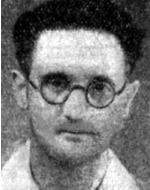Zamirin, Shalom
Son of Chaya and Menachem-Mendel, was born on March 24, 1914 in the town of Disna, in the district of Vilna, Poland. He was the ninth son in his father’s house, a home steeped in Hebrew tradition. He was educated at the “Tomchei Temimim” yeshiva in Vilna, where he studied for about four and a half years, was successful in his studies and became a perfect scholar, but his Lev was attracted to Zionism and the Hechalutz movement “He returned to his parents’ home, but from now on he devoted himself to Zionist activity in his town and was active in the Hechalutz movement as a member of Hashomer Hatzair, He joined the Kinneret group, where his brother worked and worked diligently in the banana plantation, and when World War II broke out he joined the British army in 1940, but was released on the occasion of a serious illness. On his return to the group, he began to instruct an immigrant youth group that physical work was forbidden to him, and in 1944 he was sent to study at the Hebrew University of Jerusalem, and soon became a first student in the Faculty of Humanities. His final work “Josiah and his Period” won the Klausner Prize of the Tel Aviv Municipality (the book appeared in the Bialik Institute in 1953). His work “Yirmiyahu and the false prophets” won a prize in the name of Jeremiah Hoyzner. His work on “The Question of Deuteronomy” was read, by invitation, before the World Conference on Jewish Studies, which convened in Jerusalem in 1947. Shalom was also active in the student public, participated in their newspapers, and even wanted to send him as a delegate to a student conference in Paris, but he refused. In Jerusalem he was encouraged to continue his scientific work, but Shalom returned to the group as a teacher at the agricultural school in Beit Yerah. As the War of Independence approached, he joined the Golani Brigade. The Syrians invaded the Jordan Valley on May 16, 1948, took control of several of the area’s outposts, but were stopped by our forces in Zemach. On May 18 the Syrians launched an attack on a plant with the help of artillery and tanks. Our forces did not withstand the intensity of the Syrian attack. At first, the town of Tzemach fell, and finally the police station, and the defenders retreated under Syrian fire towards Degania. In this battle he fell on the 9th of Iyar 5708 (May 18, 1948.) He was laid to rest at the military cemetery in Degania Aleph.
